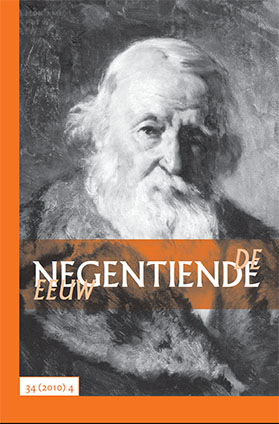Christoph De SpiegeleerTussen banketten en begrafenissen. De radicaal-liberale burgerlijke cultuur rond Charles Potvin in Brussel tijdens de tweede helft van de negentiende eeuw 289-308
Abstract (EN)
Between Banquets and Funerals. The Liberal Political and Organizational Culture around Charles Potvin in Brussels during the Years, 1850-1900.There are some serious gaps in our knowledge of the nineteenth-century Belgian liberal organizational culture. Through the writer-journalist Charles Potvin we have mapped an important part of the political culture of progressive liberalism in Brussels which led us to unforeseen networks, meeting rooms and pressure groups, uninstitutionalized politics and informal contacts. Middle-class progressive citizens, often journalists, lawyers or professors at the Free University of Brussels, gathered in interest groups like the ‘Libre Pensée’ and the ‘Ligue de l’Enseignement’. They joined such groups because of their militant anticlericalism and their disapproval of the far less radical liberal government. They voiced their criticisms and commitments in various newspapers and periodicals. Discussions were continued in Masonic lodges, among which ‘Les Amis Philanthropes’ was particularly popular. The progressive liberals came together at banquets to honour important political and literary figures, while civic funerals were used to commemorate the deceased and to show the group’s opposition to the government’s policies. This ‘bourgeois civil society’ played a role in a number of important emancipatory movements.
Liesbet WinkelmolenDe Ommelander. Een ultraliberale stem uit Groningen 309-323
Abstract (EN)
De Ommelander. An Ultra-Liberal Voice from Groningen.In 1830-31 the southern parts of the Kingdom of the Netherlands fought for their independence, which would lead to the secession of Belgium. This revolution evoked nationalistic feelings in the north, and as a result, liberal critics of the conservative, bureaucratic and centralistic rule of King Willem I restrained themselves. Cautious voices of opposition that had arisen now fell silent, and many oppositional periodicals stopped appearing. In the northern province of Groningen, however, the ultra-liberal periodical De Ommelander came out and raised its voice during the years 1831-34. De Ommelander put forward extreme opinions on polity: it argued for restrictions on the power of the King, for a constitution with ministerial responsibility, for reduction of bureaucracy, and for a new elective system. No wonder that the government in The Hague read De Ommelander closely and prosecuted the editors as soon as it found a reason to do so. This article outlines the opinions put forward in De Ommelander and places the periodical in the context of the province of Groningen. It is argued that these ideas were rooted in a society of emancipated farmers, seeking influence in provincial politics.
Rob van de Schoor‘Italië, schip zonder stuurman in de woedende golven, hoeveel ongelukkigen ballast hebt gij aan boord?’ Verbeelding en interpretatie van het Risorgimento in de negentiende-eeuwse Nederlandse letterkunde 324-341
Abstract (EN)
The Italian Risorgimento in nineteenth-century Dutch literature.A closer investigation of nineteenth-century (literary and journalistic) prose and poems about the Italian Risorgimento, as Lucy Riall and Marjan Schwegman point out, shows how Dutch writers were engaged in a process of orchestrating a new Italian identity by fashioning Giuseppe Garibaldi as a Romantic hero. Journalism and literature were closely entwined in the 1860s: narrative conventions were activated for telling the story of current political events and for understanding the motives of those involved. With its stress on Garibaldi’s revolutionary idealism and his boyish energy that did not exclude an almost feminine sensibility, the life-story of Italy’s liberator greatly appealed to educated women (writers) who were interested in politics.
Boekzaal der geleerde wereld 342-349
- Eveline Koolhaas-Grosfeld, De ontdekking van de Nederlander in boeken en prenten rond 1800. Zutphen: Walburg Pers, 2010. (Michiel Jonker)
- Robert Verhoogt, Art in Reproduction. Nineteenth-century prints after Lawrence Alma-Tadema, Jozef Israëls and Ary Scheffer. Amsterdam: Amsterdam University Press, 2007. (Lieske Tibbe)
- Anneke van Veen, De eerste foto’s van Amsterdam 1845-1875. Bussum: Toth/Amsterdam: Stadsarchief 2010. (Lieske Tibbe)
- Vincent van Gogh. De brieven, red. Leo Jansen, Harm Luijten en Nienke Bakker, Amsterdam: Van Goghmuseum. Amsterdam University Press/ Den Haag: Huygensinstituut, 2009. (Lieske Tibbe)
- Gekleurd grijs. Johannes Kneppelhout (1814-1885) en Gerard Bilders (1838-1865). Brieven en dagboek, red. Wiepke Loos. Zwolle: Waanders, 2009. (Eveline Koolhaas-Grosfeld)
- Ingelies Vermeulen en Ton Pelkmans, Marie Bilders-van Bosse, 1837-1900. Een leven voor kunst en vriendschap, [Oosterbeek]: Uitgeverij Kontrast, 2008. (Lieske Tibbe)

